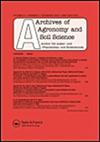玉米污泥施用评价:对作物生物量和重金属生物利用度的影响
IF 1.8
4区 农林科学
Q1 AGRONOMY
引用次数: 0
摘要
人口的增加和随之而来的废物的增加需要回收废物,以尽量减少环境负担。本研究在旁遮普的半干旱热带地区进行,以评估污泥作为常规肥料补充营养来源的不同施用率。施用5 tha - 1污泥时,籽粒产量显著高于对照,略低于10 tha - 1污泥。谷物中的镉(Cd)、铬(Cr)、铅(Pb)、镍(Ni)即使经过最大剂量的污泥处理也低于国际标准,可以宣布为安全消费。在10 t ha−1条件下,Cd和Ni的生物富集系数分别比对照提高82%和49%,Cr和Pb的生物富集系数保持不变。在10 t ha−1污泥中,碳酸盐中可交换性Cd、Pb和残渣中易还原氧化物、Ni和Cr的含量显著高于对照。随着污泥处理的增加,只有Pb和Cd的迁移率增加。综上所述,污泥的应用有利于增加植物生物量,但植物体内重金属的积累可能会限制其使用。污泥应用作为营养源的长期影响必须进行评估,以获得更深入的见解。本文章由计算机程序翻译,如有差异,请以英文原文为准。
Assessment of sludge application in maize (Zea mays L.): influence on crop biomass and heavy metals bioavailability
ABSTRACT Increasing population and subsequent increase in waste necessitate recycling of waste products to minimize the environmental burden. This study was conducted in semi-arid tropics of Punjab to evaluate different rates of sludge application as a supplementary source of nutrients to conventional fertilizers in maize. The grain yield was significantly higher with the application of 5 t ha−1 sludge over control and marginally lower than in 10 t ha−1. Cadmium (Cd), chromium (Cr), lead (Pb), and nickel (Ni) in grains were below international standards even after maximum dose of sludge treatment and can be declared as safe for consumption. The bioconcentration factor of Cd and Ni increased by 82% and 49% with 10 t ha−1 over control, respectively while it remained same for Cr and Pb. Significant increase in exchangeable Cd, Pb in carbonate, and easily reducible oxide, Ni and Cr in residual fraction with 10 t ha−1 sludge over control were found. Mobility of only Pb and Cd increased with increasing sludge treatment. Conclusively, sludge application can be beneficial in increasing plant biomass, however heavy metal accumulation in plants may limit its use. Long-term effect of sludge applications as nutrient sources must be evaluated to get more in-depth insights.
求助全文
通过发布文献求助,成功后即可免费获取论文全文。
去求助
来源期刊

Archives of Agronomy and Soil Science
AGRONOMY-SOIL SCIENCE
CiteScore
5.50
自引率
4.20%
发文量
107
期刊介绍:
rchives of Agronomy and Soil Science is a well-established journal that has been in publication for over fifty years. The Journal publishes papers over the entire range of agronomy and soil science. Manuscripts involved in developing and testing hypotheses to understand casual relationships in the following areas:
plant nutrition
fertilizers
manure
soil tillage
soil biotechnology and ecophysiology
amelioration
irrigation and drainage
plant production on arable and grass land
agroclimatology
landscape formation and environmental management in rural regions
management of natural and created wetland ecosystems
bio-geochemical processes
soil-plant-microbe interactions and rhizosphere processes
soil morphology, classification, monitoring, heterogeneity and scales
reuse of waste waters and biosolids of agri-industrial origin in soil are especially encouraged.
As well as original contributions, the Journal also publishes current reviews.
 求助内容:
求助内容: 应助结果提醒方式:
应助结果提醒方式:


